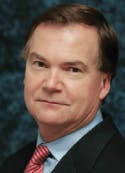As most readers know by now, the laboratory community
successfully won one of the most difficult advocacy battles it ever
faced on July 15 of this year. On that date, Congress voted to override
the president’s veto of Medicare legislation that included not only a
repeal of the laboratory competitive-bidding demonstration (CBD) project
but also extended the “TC Grandfather” clause for 18 months and reversed
the 10.6% reduction in the Physician Fee Schedule. A fourth win for labs
occurred the next day when the government announced that the inflation
figure on which the laboratory update is based will mean a 4.5% update
for the clinical-laboratory fee schedule starting Jan. 1, 2009.
The effort required for this victory cannot be
overstated; we repealed an existing program that was legislatively
mandated — only the third bill override in the Bush administration. It
exemplifies how when the laboratory community works together, great
results can be achieved. This is not the time, however, to rest on our
laurels.
Peter R. Orszag, director of the Congressional Budget
Office, states that rising healthcare costs pose a fundamental risk to
the United States’ economic future. He noted accurately that Medicare
and Medicaid — if they continue growing at their current rate — are on a
path to exceed 20% of the gross domestic product. Taming escalating
healthcare costs is a priority item on both presidential candidates’
agendas.
This is not an insurmountable task, as long as
policymakers embrace a core, fundamental truth in their work to shape the
future of public-health programs. It costs less to keep people healthy than
to treat them when they become seriously ill. Laboratory services are a
fundamental component of prevention. The laboratory community must continue
communicating this value message to decision makers. The focus should be on
educating Congress on the adverse impact of cutting lab reimbursement;
broadening coalition participation inside and outside the lab community; and
continuing to push grassroots involvement and to expand our Congressional
champions.
I am convinced that genetic-molecular testing is not only
the future vitality of the lab sector but also the key element of a new
prevention-oriented healthcare-delivery paradigm. We need to move away from
trial-and-error medicine and embrace the new frontier called personalized
medicine. Building upon knowledge derived from the mapping of the human
genome, this approach enables diagnosis — even before symptoms appear — far
more precisely than ever before, and medical treatments that can be tailored
to an individual’s unique genetic makeup, even to the unique makeup of the
disease or infection itself.
Finally, a word must be said about perhaps the most
significant underlying cause of skyrocketing health costs — inappropriate
utilization. We all know the myriad of policies and incentives that lead to
this, but what is too often overlooked is how personalized medicine can help
unravel it. One of the best examples is reflected in the fact that even
blockbuster drugs provide only a limited degree of efficacy in as much as
70% of patients. If we provide patients with more targeted therapy based
upon their genomic profile that is also guided by diagnostic testing, we
have clear potential to improve that impact. The economic savings here are
also impressive. The costs to the healthcare system of ineffective therapy
have been estimated to reach as much as $1.2 billion for hypertension, $4.7
billion for anti-depressants, and $8 billion for statins for cardiovascular
disease.
The laboratory community can be part of a more effective,
more cost-efficient healthcare system that can enable millions of Americans
to prevent disease and live longer, healthier lives. By collectively
communicating this message, laboratory medicine will play a compelling and
vital role in this vision.
More about ACLA
ACLA
members include independent providers of laboratory services in the
United States. Any corporation, partnership, or individual with one or
more clinical laboratory facilities licensed by the federal government
under the Clinical Laboratory Improvement Amendments (CLIA) of 1988 is
eligible for membership. Membership dues are based on annual revenue.
The fee schedule is determined by the board of directors.
By offering services in the area of representation, education,
information, and research, ACLA provides effective communication between
federally licensed clinical laboratories and government regulatory
bodies, public-health officials, professional associations, other
healthcare organizations and the public.
ACLA represents national, regional, and local
clinical laboratories. The advantages of ACLA membership include:
- Taking an active role in advocating for the
clinical laboratory industry before federal and state legislative
and regulatory bodies. - Serving on ACLA’s active committees that set ACLA
policy in the areas of government reimbursement, state issues,
CPT-coding issues, legal matters, environmental, and other important
laboratory issues. - Participating in ACLA’s weekly member conference
calls where every ACLA member clinical laboratory can hear the
latest updates on federal and state issues, and discuss strategies
for advancing the lab industry’s message. - Participating in frequent meetings and conference
calls in Washington, D.C. with key legislative and regulatory
policymakers on the critical laboratory issues.
Because most ACLA member companies do not have
representation in Washington, ACLA extensively uses conference calls to
allow all of its members to participate in meetings.
Alan Mertz, president of the ACLA, has spearheaded various advocacy campaigns on behalf of the clinical-lab community. He also served as executive VP of the Healthcare Leadership Council and created the Alliance to Improve Medicare; served in three senior staff positions in the Senate and House of Representatives; and also taught graduate courses in political management at GWU’s Graduate School.


